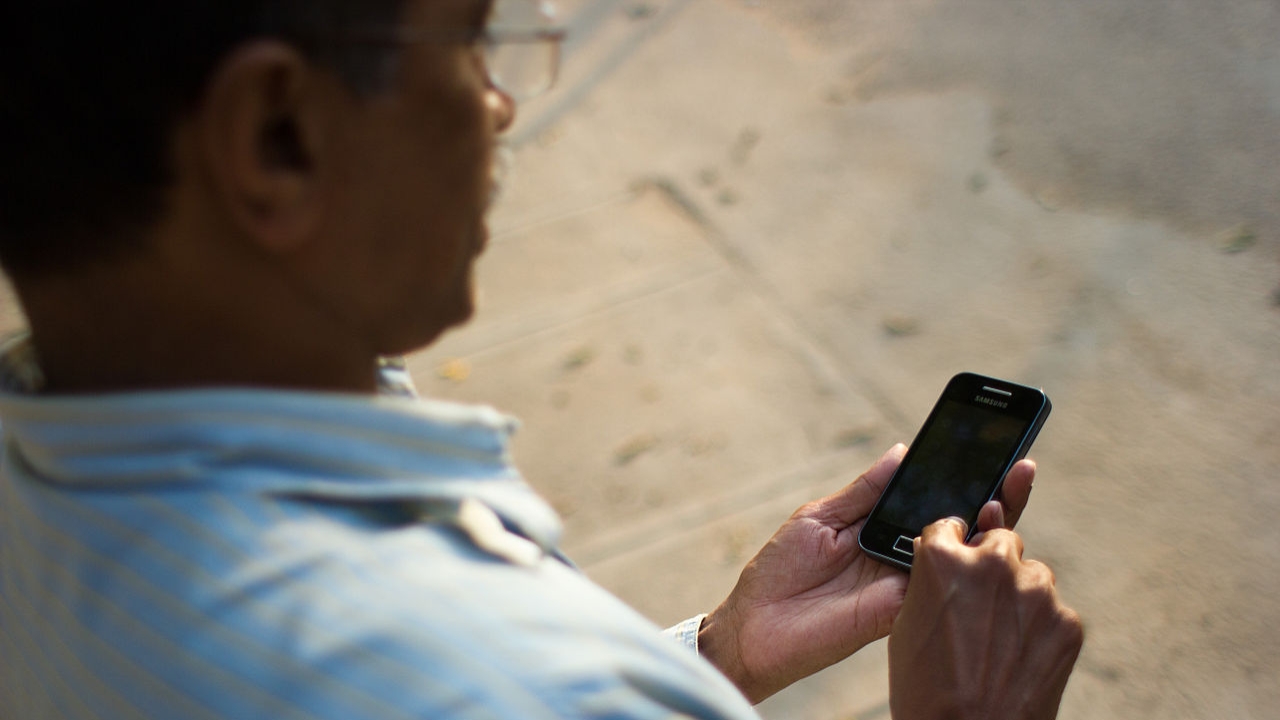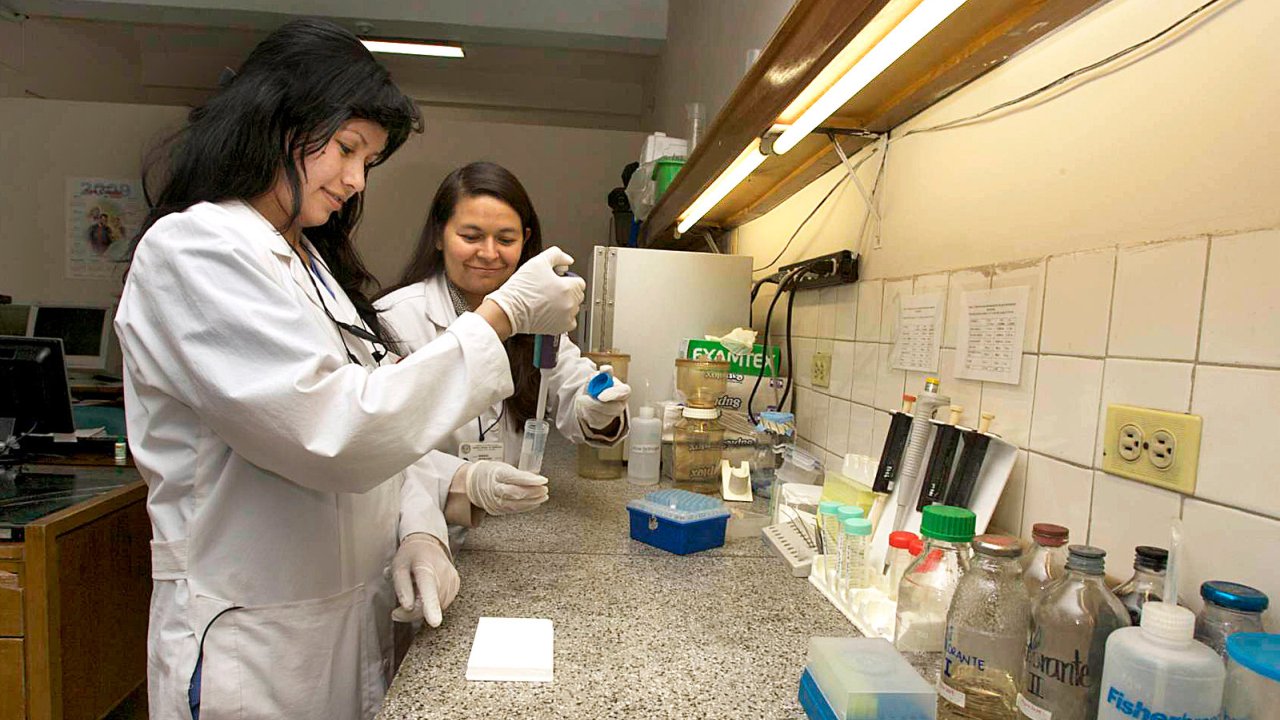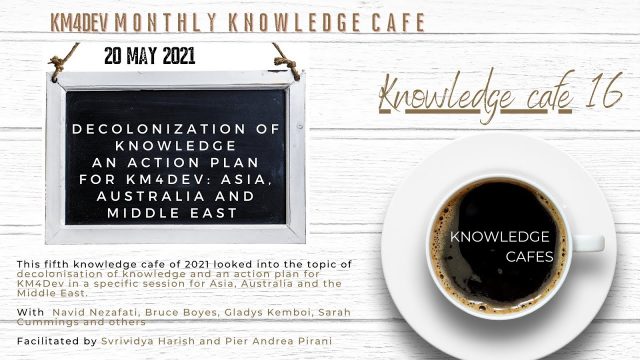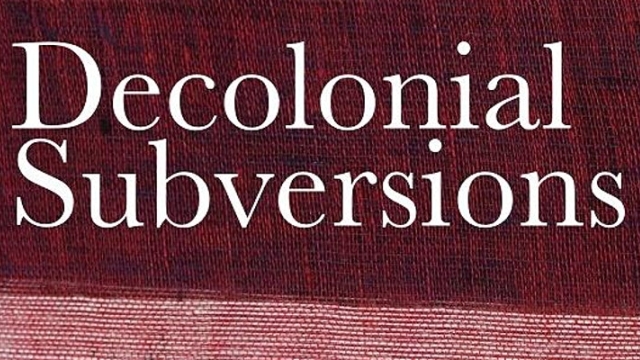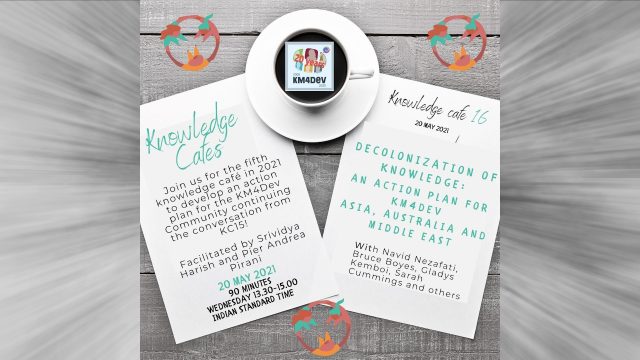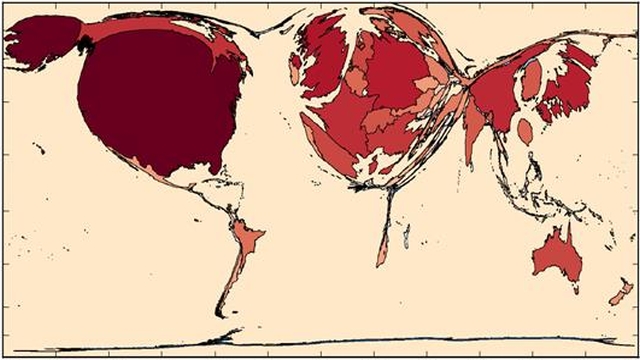
New initiatives begin decolonising research, libraries, and knowledge systems. But what about decolonising KM?
This article is part of a series of articles on decolonising KM.
In a previous RealKM Magazine article, I alerted to the serious global knowledge imbalance, which extends to knowledge about knowledge management (KM). As an article from The Conversation that I quoted states:
If the world were mapped according to how many scientific research papers each country produced, it would take on a rather bizarre, uneven appearance. The Northern hemisphere would balloon beyond recognition. The global south, including Africa, would effectively melt off the map.
I reproduced that map in my article, and the figure above shows an almost identical map, this time looking at just the research articles used in teaching public health courses1.
Note the extremely bloated size of the United States and Europe compared to South America, Africa, and much of Asia. This global knowledge imbalance means that research findings drawn primarily from the United States and Europe are being imposed on the very different cultures and societies of the global South. However, the findings of a 2010 paper2 suggest that the members of the western, educated, industrialized, rich, and democratic (WEIRD) societies of North America, Europe, and Australia are “among the least representative populations one could find for generalizing about humans.”
But it’s not just about imposing western knowledge on the global South. As Dr Romina Istratii from SOAS University of London alerts3, Euro-American ways of knowing, knowledge production, and theoretical thinking are also imposed.
So, while the physical colonisation of the countries of the global South by the countries of the global North may have ended, knowledge colonialism continues. Growing recognition of this continued colonialism has given rise to a growing number of decolonial initiatives. These include:
- Decolonising research and higher education
- Decolonising libraries
- Decolonising African knowledge systems.
Interestingly, every one of these decolonial initiatives has originated in the United Kingdom (UK). In relatively recent history, Britain was a dominant global colonial power, adding lands across the world to the British Empire. In those times, traditional British ideas were imposed on the colonies. However, nowadays the UK is highly culturally diverse, with this diversity found to benefit innovation4 and creativity5. The UK is now ranked in the top 10 in the Global Knowledge Index, and its leadership in regard to KM includes the new KM standard ISO 30401:2018 Knowledge management systems – Requirements and CILIP KM Chartership.
Decolonising research and higher education
In June 2018, the Research Students’ Association (RSA) of the SOAS University of London and the SOAS Journal of Postgraduate Research (SJPR) organised a joint conference on the theme of Decolonisation in Praxis. A volume6 of SJPR dedicated to Decolonisation in Praxis was also published. An editorial7 in the volume advises that “The term ‘praxis’ (from the Greek ‘πρᾶξις’) … pertains to ‘action’ or ‘doing’ and reflects the objective … to explore practical and embodied ways for overcoming west-centric attitudes and perspectives in the realm of knowledge-making.”
A conversation on decolonising research then took place at SOAS in September this year, led by Dr Romina Istratii, Research Funding Officer with the SOAS Research Office. The event was attended by almost a hundred people and watched online by an even larger number of viewers internationally, and included three panels and 13 presentations by researchers, academics, practitioners, funders and research office directors from the health and social sciences in the UK and internationally. A report from the event8 is now available.
To continue the conversation, a follow-on lunchtime series is being convened by Oxford University and SOAS through until mid-2020. Each event will be live streamed so that people can participate remotely. A report from the first event in the series is now available.
Dr Istratii has also established the Decolonial Higher Education email discussion list to facilitate interconnections and mutual learning between research offices, researchers, and funders in higher education in the UK and globally.
Decolonising libraries
The CILIP International Library & Information Group (ILIG) in conjunction with Cardiff Metropolitan University convened the “Decolonising Library collections and practices: from understanding to impact” conference in November. Presentations, posters, and notes from the conference are available on the event Padlet.
There is also a Library & Information Science (LIS) – Decolonise email discussion list.
Related to both higher education and academic libraries, a newly published paper9 explores the diversity of university reading lists, concluding that “The findings suggest that there is empirical basis for claims that university reading lists in the UK context are dominated by white, male and Eurocentric authors.”
Decolonising African knowledge systems
The London School of Economics and Political Science (LSE) is hosting the event Decolonising Knowledge Systems on 16 January 2020.
The event materials advise that “The speakers will meticulously trace the progress made in decolonising Africa’s knowledge systems as well as present ideas on how these systems can be rethought, re-framed and reconstructed to rid them of the hegemony of Euro-centrism.”
But what about decolonising knowledge management?
A recent paper10 shows that the global knowledge imbalance is also found in KM research, as shown in the following map.
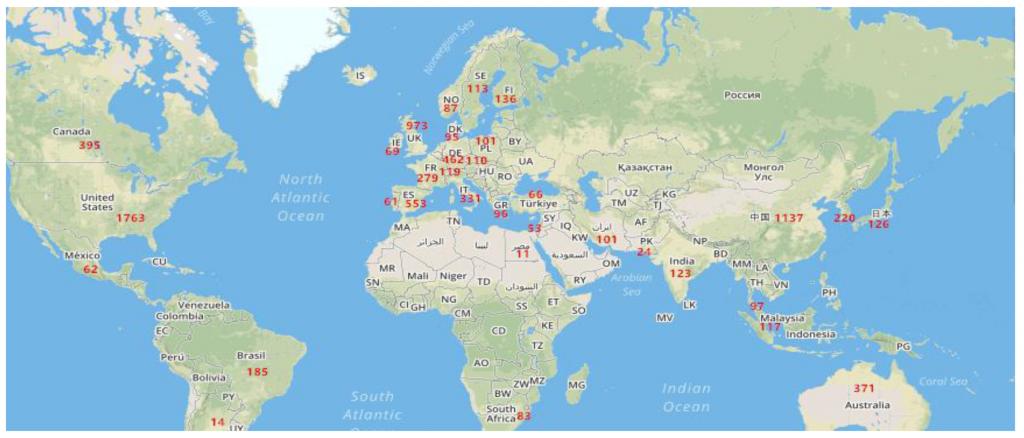
Echoing the bloating discussed above, two-thirds of the mapped KM research papers were produced in the United States, the United Kingdom, and Europe. If the other major global North WEIRD societies of Canada and Australia are added, the proportion rises to three-quarters.
By stark comparison, there are very few KM research papers from much of Africa, South America, Central America, the Middle East, Central Asia, South-East Asia, and Russia. The only other country to have produced a large number of KM research papers is China, but it should be noted that more than half of the papers produced in China came from just the two small regions of Taiwan and Hong Kong.
As I’ve previously cautioned, these findings mean that what many would regard as globally universal KM practices and approaches can’t actually be considered as such on the basis of the available evidence.
Further, not having researchers from the global South take the lead role in researching issues related to the global South increases the risk of incorrect conclusions being drawn. I’ve already documented cases of research in regard to China in which this was potentially a factor. In one example, incorrect conclusions were drawn about the socialisation of schoolchildren, and in another example, incorrect conclusions were drawn about knowledge flows in management structures.
Given the growing momentum to decolonise research, libraries, and knowledge systems, the KM community needs to play a more active role in progressing the decolonisation of KM. I plan to shortly engage in discussions in this regard with the leaders of the UK decolonisation initiatives.
References
- Istratii, R. & Lewis, A. (2019). Applying a Decolonial Lens to Research Structures, Norms and Practices in Higher Education Institutions: Conversation Event Report. SOAS University of London: Research and Enterprise Directorate. https://eprints.soas.ac.uk/32053/ ↩
- Henrich, J., Heine, S. J., & Norenzayan, A. (2010). The Weirdest People in the World. Behavioral and Brain Sciences, 33, 61–83. ↩
- Istratii, R. & Lewis, A. (2019). Applying a Decolonial Lens to Research Structures, Norms and Practices in Higher Education Institutions: Conversation Event Report. SOAS University of London: Research and Enterprise Directorate. https://eprints.soas.ac.uk/32053/ ↩
- Mayer, R. C., Warr, R. S., & Zhao, J. (2018). Do Pro‐Diversity Policies Improve Corporate Innovation?. Financial Management, 47(3), 617-650. ↩
- Lauretta McLeod, P., & Lobel, S. A. (1992, August). The effects of ethnic diversity on idea generation in small groups. In Academy of Management Proceedings (Vol. 1992, No. 1, pp. 227-231). Briarcliff Manor, NY 10510: Academy of Management. ↩
- Istratii, R. & Hirmer, M. (eds) (2018). Decolonisation in Praxis. The SOAS Journal of Postgraduate Research, 11. ↩
- Istratii, R., Hirmer, M. & Lim, I. (2018). ‘Editorial I: Conference Proceedings ‘Decolonisation in Praxis’, SOAS 2018.’ The SOAS Journal of Postgraduate Research, 11. pp. 6-9. ↩
- Istratii, R. & Lewis, A. (2019). Applying a Decolonial Lens to Research Structures, Norms and Practices in Higher Education Institutions: Conversation Event Report. SOAS University of London: Research and Enterprise Directorate. https://eprints.soas.ac.uk/32053/ ↩
- Bird, K. S., & Pitman, L. (2019). How diverse is your reading list? Exploring issues of representation and decolonisation in the UK. Higher Education, 1-18. ↩
- Wang, P., Zhu, F. W., Song, H. Y., Hou, J. H., & Zhang, J. L. (2018). Visualizing the Academic Discipline of Knowledge Management. Sustainability, 10(3), 682. ↩
Also published on Medium.

